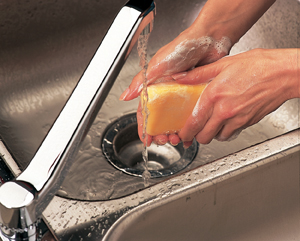Cancer: Preventing Infections
Cancer and cancer treatments can make your body less able to fight off infection. Chemotherapy (chemo), surgery, radiation therapy, immunotherapy, and targeted therapy can all affect how your body responds to infections. For example, chemo reduces the number of your white blood cells. White blood cells fight infection in your body. Surgery creates an opening in your skin that germs can enter through. Your immune system may work less well if you have trouble eating because of cancer.
Follow all instructions from your healthcare provider to help prevent infections. The steps you need to take depend on your type of cancer and treatment. They also depend on your overall health. Use these tips as a guide.
 |
| Scrub your hands with soap and warm water for at least 15 seconds. |
Know your nadir
The nadir is the time during your chemo cycle when you have the fewest white blood cells. The length of your nadir and when it occurs depend on the medicines you are taking. Each medicine has its own nadir. Talk with your healthcare provider about your nadir period. Then take extra care to prevent infection at that time.
Protect yourself
-
Keep your hands clean. Bathe every day to reduce your risk for infection. Wash your hands often throughout the day. For best results, lather them with soap for at least 20 seconds with clean, running water. Wash your hands after blowing your nose, coughing, and sneezing. Wash them before and after eating, and after spending time in public places. Wash them after using the bathroom, changing diapers, or helping a child use the bathroom. Ask those around you to also wash their hands often.
-
Stay away from some foods. Don’t eat uncooked or undercooked meat or fish. Wash fruits and vegetables before eating. You may also be told not to eat raw vegetables or thin-skinned fruits during your nadir.
-
Reduce your risk for illness. During this time, your body is less able to fight off colds and other illnesses. Stay away from anyone who has a fever or an infection. Ask your healthcare provider if you need to get any vaccines.
-
Wear gloves. Make it harder for infections to get into your body. Wear gloves when you work around germs and dirt. Have someone else clean a pet’s tank, cage, or litter box.
-
Try not to cut yourself. Protect your feet from injury and germs by not walking barefoot. Use an electric shaver. Be careful when using knives or other sharp objects. If you get a cut or scrape, wash it with soap and clean water. Cover it with a clean bandage.
-
Stay away from crowds. This is especially important during your nadir. Wear a mask if you have to be in a crowd.
How medicines can help
You may need to take medicines to:
-
Prevent and treat infection. Antibiotics attack and kill the germs that cause infection from bacteria. You may also need to take antiviral and antifungal medicines.
-
Trigger new white blood cell growth. These medicines are called growth factors. They help your body make new white blood cells in your bone marrow. This help to fight infection. Filgrastim (and biosimilars) and pegfilgrastim are examples of growth factors. Neupogen is one of the names of this kind of medicine.
Talk with your healthcare provider about the best medicines for you. In some cases, they may tell you to not take acetaminophen or nonsteroidal anti-inflammatory drugs for pain. This is because these medicines can hide a fever if you have a low white blood cell count (neutropenia). Talk with your healthcare provider about medicine for pain if you need it during your nadir period.
When to call your healthcare provider
Contact your healthcare provider right away if you have any of the following:
-
Fever of 100.4ºF (38ºC) or higher, or as directed by your healthcare provider
-
Chills
-
Burning when you urinate
-
Coughing, nasal congestion, or sore throat
-
Shortness of breath
-
Vomiting or diarrhea
-
Pain, redness, or swelling, especially near an open wound or catheter site
Online Medical Reviewer:
Jessica Gotwals RN BSN MPH
Online Medical Reviewer:
Susan K. Dempsey-Walls RN
Online Medical Reviewer:
Todd Gersten MD
Date Last Reviewed:
8/1/2023
© 2000-2024 The StayWell Company, LLC. All rights reserved. This information is not intended as a substitute for professional medical care. Always follow your healthcare professional's instructions.